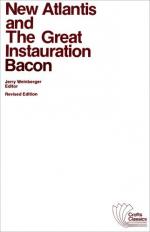|
This section contains 3,024 words (approx. 11 pages at 300 words per page) |

|
SOURCE: "The Early Modern Utopias," in The Utopiansm of Frances, Bacon's 'New Atlantis,'" in The History of Utopian Thought, The Macmillan Company, 1923, pp. 121-80.
In the following excerpt, Hertzler examines several Utopian aspects of the New Atlantis and comments on how the nature of Bacon's thinking best applies to social science.
There was a paucity of Utopian literature for nearly a century following the appearance of More's Utopia. This silence was broken in England by Francis Bacon, Baron of Verulam, with his ingenious fragment, the New Atlantis. He never finished this work but enough remains to show what the nature of his thinking was, and illustrates the application of his best thought to social science.
Francis Bacon was born in 1561 at London, the son of Sir Nicholas Bacon, who was Lord Keeper of the Great Seal. Like More, he was intended for orders, but instead was educated...
|
This section contains 3,024 words (approx. 11 pages at 300 words per page) |

|


